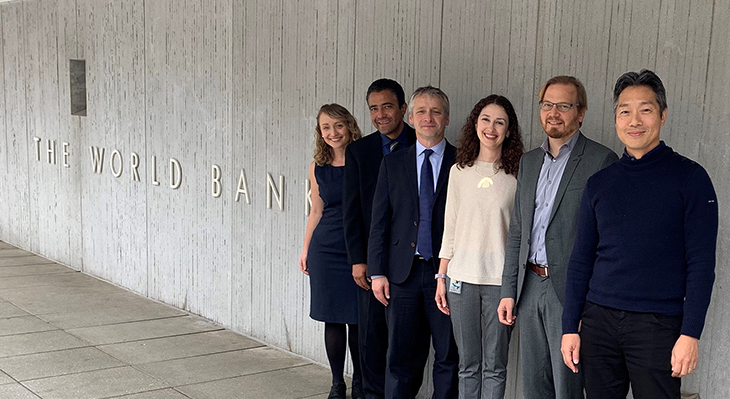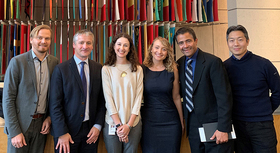US shows increasing interest in dual training
Over recent years, a planned US government legislative initiative has increasingly focussed public attention on the topic of dual vocational education and training. Following an invitation from the German Embassy, Prof. Dr. Hubert Ertl, Director of Research and Vice President of BIBB, last week participated as an expert as regards the dual vocational education and training system in high-level events taking place in Boston and in Washington DC on the subject of the American reform process.

On 31 October 2019, Prof. Ertl and representatives of the departments of labour, economic affairs and education met at the main office of the Representative of German Industry and Trade in Washington D.C. (RGIT). The Americans were particularly interested in experience with projects for establishing vocational education and training organised on a dual basis in economic sectors that have little previous experience of training in the workplace. This is the aim behind the planned introduction of the Industry-Recognized Apprenticeship Program (IRAP) in the US. Prof. Ertl cautioned against pressing ahead with expansion at the expense of transparency and the quality of training standards. He explained that training standards had to be created on a sector-wide basis and not just reflect the requirements of individual companies.
Core elements of dual training — the basis for international cooperation and consultancy in VET

BIBB's experience in cooperating with and offering consultancy to foreign partners on issues relating to vocational education and training was the subject of a seminar given by Prof. Ertl at the World Bank following the meeting at RGIT. The staff from the World Bank and from other government and non-government organisations were very interested in approaches developed by BIBB for setting up and supporting vocational education and training systems where workplace-oriented learning was not traditionally established.
During the discussion panel, questions primarily addressed the involvement of social partners in training events with respect to foreseeable changes in national and global labour markets and in relation to the necessary changes to training content and methods brought about by digitalisation. At the end of the seminar, World Bank representatives stressed their interest in working with BIBB in future on issues of sustainable international corporation and consultancy in vocational education and training.
Workplace-oriented training — a key element in skilled worker strategies

Future strategies for the development of workplace-oriented vocational education and training in the US was also the focus of the podium discussion which was held on 1 November 2019 as part of the German American Conference at the Harvard Kennedy School. Prof. Ertl introduced specific aspects of the German discussion and particularly emphasised the importance of collaboration between employers and employee representatives in the development of training regulations in Germany. In view of the current reform efforts in the US, a robust process, accepted by all parties involved, for determining training content and standards appears to be particularly important. However, in many areas there is a lack of a consensual process in the US to support this.
For the Americans, John Ladd from the US Department of Labor emphasised that the involvement of employee representatives in many US states is problematic as the required trade union structures are not in place everywhere.
Barbara Humpton, CEO of Siemens USA, pointed to training programmes at Siemens which are based on dual training standards in Germany and which contribute significantly to securing the company's supply of skilled labour in the US. She also acknowledged that the expertise the German parent company and the size of the company made it easier to offer modern training.
Andrea Mayfield, Director of the Mississippi Community College Board, talked about community college strategies for developing training programmes in cooperation with local companies. However, funding shortfalls in collaborative projects frequently proved to be an insurmountable obstacle. She explained that in this case it was the responsibility of the state to provide more support.
In the Q&A session, podium discussion participants addressed with the audience, among other things, the issue of integrating young people from social minorities. In the course of this it became apparent that, despite all the differences between the systems, there really are similar experiences with selected integration tools. Useful instruments therefore need to be created for the long term and must specifically address the particular needs of various target groups.
Background
Over the last two years, the US government has pressed ahead with reforms in the education and training system with the aim of strengthening and expanding training organised on a dual basis. Over the two-month consultation period following the publication of the proposed rule, more than 325,000 comments, opinions and counter proposals were received by the Department of Labor. This shows just how relevant the issue is and the differing views relating to it. The proposed rule can be accessed at the following link.
Proposed Rule on Industry-Recognized Apprenticeship Programs